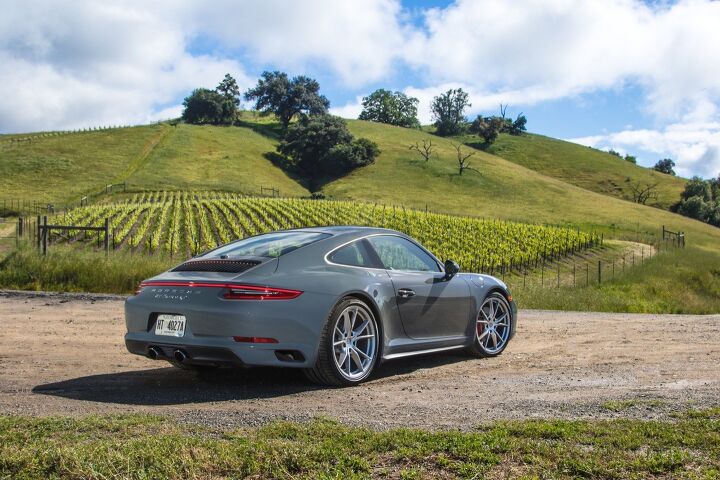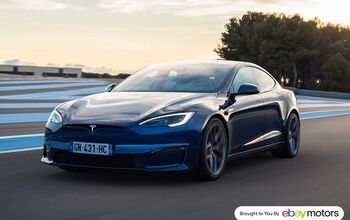You'll Have to Pry the Steering Wheel From Porsche's Cold, Dead Hands

Like BMW, which aims to keep gas-powered M cars in production for as long as humanly possible, Porsche is also making a commitment to motoring purity in the face of new technologies and government overreach. That circular device positioned in front of the driver? Porsche wants to keep it there.
The specter of Big Government and Big Safety conspiring to kill non-autonomous motoring is a real fear, one that’s been talked about more than a little here at TTAC. Call it the Red Barchetta scenario.
Porsche seems aware of it, too, though it tiptoes around the entity at the center of the issue. Nevertheless, the automaker claims a future Porsche “will be one of the last automobiles with a steering wheel.”
That’s the view of Lutz Meschke, vice-president of the company’s executive board and head of finance and IT. In an interview published by the automaker, Meschke lays out the short and medium-term future for both self-driving technology and the steering wheel.
No one knows what the long-term holds, but many of us, Meschke included, seem to believe it’s a future where safety tops personal autonomy. A future where your car drives you, no ifs, ands, or buts.
“A Porsche will always be a car that you will want and be able to drive yourself,” he said, adding much later that the act of driving “will hopefully remain the most important thing at Porsche for a very long time.” Still, Porsche isn’t going the Luddite route when it comes to assist-type features that drivers might want to pay extra for — or demand as standard kit.
From the parking lot to the racetrack, “We see digitalisation and autonomous driving not as a threat but as a tremendous opportunity,” Meschke said. For the former scenario, traffic jam assistants and automated parking systems are seen as the most useful features for the brand. For buyers in Porsche’s price range, these will soon become “must haves,” he said.
Luxury car ownership obviously means the option of taking it as easy as possible. Next year’s Cayenne brings the brand’s most advanced driver’s aids yet, Meschke claims. After that, the Mission E electric sedan ( due to appear in 2019) represents the next big leap in autonomous features.
For the weekend racer, automation could mean the ability to navigate a track like your favorite pedal jockey — just download a particular race, recorded by a driver piloting the same car on the same course, and learn from your vehicle. Porsche calls that idea the “Mark-Webber-function,” named after its seasoned brand ambassador.
“With this function, the vehicle could drive autonomously on a racetrack like the Nürnburgring – just like Webber would drive,” said Meschke. “The car drives an ideal course and demonstrates perfect brakes in the curves, where to best shift and where to accelerate. First, software saves the exact course Mark Webber drives on a racetrack. These data are used by the autonomous vehicle to drive the course identically. Afterwards the customer can reclaim the steering wheel and let the car show him the ideal course, thus training and improving his skills as a driver via direct feedback from the car. This is technically possible already. Of course, the driver can improve over time and learn new things.”
Naturally, other tracks and drivers would be part of such a hypothetical feature. Back in the real world, Porsche plans to make more of its money from digitalisation, the less-sexy, once-removed cousin of automation. For example, it already offers German customers the ability to order additional insurance online (“Porsche Shield”) before heading to the track.
In the medium term, Porsche hopes to generate a two-digit percentage of its business from digital services. As for the long term, well, that likely involves a rogue Porsche engineer in the last production 911 deftly avoiding Kraftfahrt-Bundesamt road safety drones as he races for the Swiss border.
[Image: Porsche]

More by Steph Willems
Latest Car Reviews
Read moreLatest Product Reviews
Read moreRecent Comments
- MaintenanceCosts 308/311 is just the rating of the gas engine by itself. The full powertrain power rating, taking into account both power sources is 483/479. The car will do 0-60 in under five seconds. Frankly, I find the idea of that being "underpowered" bizarre.Also, "understated" has never been less fashionable within my lifetime. We are in a moment where everyone wants to make a Bold Statement with everything they do.
- 28-Cars-Later @PoskySo here's some interesting data, Manheim's Used Car index is still 28% higher than shortly before the Plandemic (155 on chart) after declining from a height of 39% (roughly 215) in January 2022, yet interest rates are now more than double on average. Maybe the White House should focus on some deflationomics instead of mucking up everything?
- Dale Had one. The only car I ever bought because of a review in a guitar magazine.Sure was roomy inside for such a small car. Super practical. Not much fun to drive even with a manual.Sent it to college with my stepson where it got sideswiped. Later he traded it in on an F-150.
- Bd2 Hyundai's designs are indeed among the most innovative and their battery technologies should allow class leading fuel consumption. Smartstream hybrids are extremely reliable.
- 28-Cars-Later So now H/K motors will last longer in between scheduled replacements. Wow, actual progress.


































Comments
Join the conversation
Hey autonomous fanboi's...Roll this puppy out in Mumbai first, and lets see how THAT goes. Until then, its totally misplaced and underbaked. For First World urban transit bus routes, I can get it. The way its postulated as the next big thing? Not so much.
BMW, Porsche and a few others recognize that some of us actually like driving and have no intention of giving up the enjoyable activity to computers.